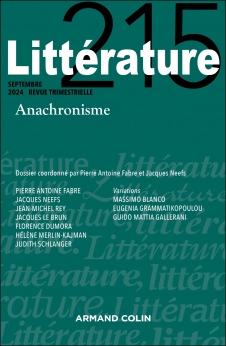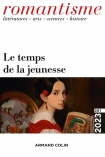
LITTÉRATURE Nº215 (3/2024)
Pour acheter ce numéro, contactez-nous
Recevez les numéros de l'année en cours et accédez à l'intégralité des articles en ligne.
L’anachronisme s’impose par ses usages. Péguy montre que l’affaire Dreyfus est, pour certains, l’occasion d’inventer des intentions obsolètes : interventions sur le temps qui minimisent l’affaire. De même, l’idée que cette affaire a été préparée. C’est une création en arrière qu’on retrouve dans la Querelle des historiens allemands. Un tout autre usage analysé par Péguy : la mise en regard d’une Pétition des ouvriers de Saint-Pétersbourg au Tsar, en 1905, et du début d’OEdipe-Roi. De la ressemblance naît un sens aigu de l’actualité. Bergson analyse la tendance de l’esprit : les vérités mathématiques se détachent de leur histoire et apparaissent éternelles. Cela vaut pour toute forme de vérité. Le romantisme opère rétroactivement, crée après-coup sa préfiguration et son explication. Avec sa notion tardive d’Implexe, Valéry met au jour d’autres formes d’anachronisme faste.
Anachronism imposes itself through its uses. Péguy shows that the Dreyfus affair is, for some, an opportunity to invent obsolete intentions: interventions over time which minimize the affair. Likewise, the idea that this affair was prepared. It is a backward creation that we find in the Querelle of the German historians. A completely different use analyzed by Péguy : the comparison of a Petition from the workers of Saint Petersburg addressed to the Tsar, in 1905, and the beginning of Oedipus-Rex. From the resemblance comes an acute sense of topicality. Bergson analyzes the tendency of the mind : mathematical truths detach themselves from their history and appear eternal. This goes for any form of truth. Romanticism operates retroactively, creates its own prefiguration and explanation after the fact. With his late notion of Implexe, Valéry brings to light other forms of pompous anachronism.

